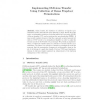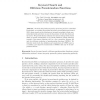ASIACRYPT
2000
Springer
13 years 8 months ago
2000
Springer
The mobile agent is a fundamental building block of the mobile computing paradigm. In mobile agent security, oblivious transfer (OT) from a trusted party can be used to protect th...
TCC
2004
Springer
13 years 10 months ago
2004
Springer
Abstract. Until recently, the existence of collection of trapdoor permutations (TDP) was believed (and claimed) to imply almost all of the major cryptographic primitives, including...
CIS
2004
Springer
13 years 10 months ago
2004
Springer
Abstract. In the m-out-of-n oblivious transfer model, Alice has n messages, Bob has m choices. After the interaction between the two parties, Bob can get m but only m messages from...
ASIACRYPT
2004
Springer
13 years 10 months ago
2004
Springer
We consider the problem of securely computing the Greater Than (GT) predicate and its generalization – securely determining membership in a union of intervals. We approach these ...
TCC
2005
Springer
13 years 10 months ago
2005
Springer
We study the problem of privacy-preserving access to a database. Particularly, we consider the problem of privacy-preserving keyword search (KS), where records in the database are ...
CRYPTO
2005
Springer
13 years 10 months ago
2005
Springer
Since bit and string oblivious transfer and commitment, two primitives of paramount importance in secure two- and multi-party computation, cannot be realized in an unconditionally ...
IWSEC
2009
Springer
13 years 11 months ago
2009
Springer
Reducing the minimum assumptions needed to construct various cryptographic primitives is an important and interesting task in theoretical cryptography. Oblivious Transfer, one of ...




